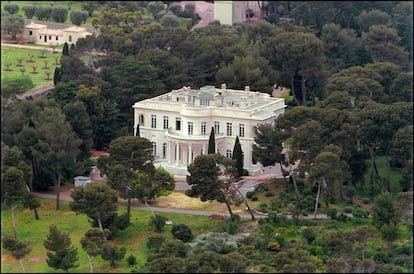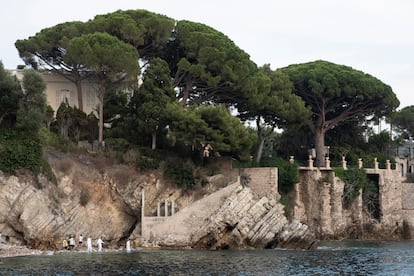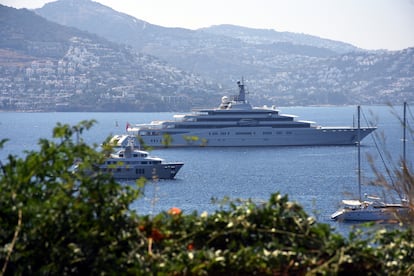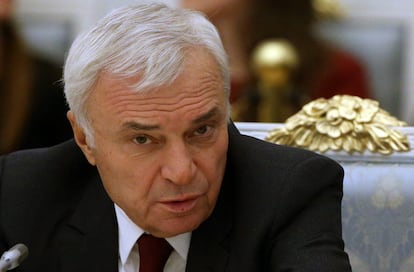War no obstacle for Russia’s super-rich: Summer vacations in Dubai and Turkey, instead of the French Riviera
Sanctions due to the conflict in Ukraine may prevent the oligarchs of Moscow and St. Petersburg from reaching their favorite destinations in Greece, Italy and the US, but they won’t stop them from enjoying the holidays elsewhere

Russian elites have always had a soft spot for the French Riviera or Côte d’Azur. After the Russian Revolution, Grand Duke Andrei Vladimirovich, a cousin of Nicholas II, Russia’s last tsar, fled to Villa Marizzina – a palace on a precipice in Cap-d’Ail – with his mistress, the famous ballerina Mathilde Kschessinska. Grand Duke Dmitri Pavlovich, another cousin of Nicholas II and one of the architects of Rasputin’s assassination in 1916, also chose the French Riviera to live out his love story in exile with another celebrity of the time, Coco Chanel. With the fall of the Soviet Union, Russians returned to the Mediterranean coast, landing at Cap d’Antibes and Saint-Jean-Cap-Ferrat. The nouveaux riches of Moscow and St. Petersburg bought up the old mansions, turning the area into their summer playground.
But this year the oligarchs will have a harder time vacationing in their villas and sailing their luxury yachts through the French Mediterranean. European airspace is technically closed to them, visas are hard to come by and their credit cards are blocked as a result of the Russian invasion of Ukraine. The French government has frozen more than €500 million in properties, including around 30 mansions in the Cap d’Antibes area, such as the Château de la Croë, the castle owned by Russian oligarch Roman Abramovich (formerly the residence of the Duke and Duchess of Windsor); Villa Hier, which is owned by oil trader Suleyman Kerimov; Villa Altaïr, home of Andrey Melnichenko, the king of commodities; and Villa Nellcôte, the belle époque home of iron and steel tycoon Viktor Rashnikov.
Many Russian magnates also used to stay at the Hotel du Cap-Eden-Roc. Built in 1870 by Alexey Plastcheef, a former captain in the Russian Imperial Guard, it is one of the most luxurious hotels in Cap d’Antibes and a favorite among the rich and famous. This summer, Russia’s wealthy elite have not arrived, and are not expected to. “In recent years, we used to receive 8% of guests from Russia. That was until 2020. With the Covid pandemic, the Russian market began to slow down,” explains Valerie Muller, the hotel’s communication manager. “In fact, this season we do not have reservations from Russia or Ukraine, which is understandable given the situation. However, these markets have been replaced by visitors of other nationalities, and all our rooms are booked for the summer season,” she adds.

France is not the only country that is closed to the Russians. Vladimir Putin’s war has made it nearly impossible for Moscow and Petersburg elites to reach their favorite destinations in Greece, Italy, the Caribbean and the United States. In Spain, sanctions due to the invasion of Ukraine are expected to stop around 935,000 Russian tourists from visiting the country. According to figures from Spain’s National Institute of Statistics (INE), this will mean Spain will lose more than one in 100 tourists and more than €83 million in revenue.
So, where are Russia’s super-rich going to spend the summer this year? “Almost none of my friends or acquaintances have told me that they are going to travel to Italy or Spain. As far as I know, Dubai is the new place where many will go. Also Turkey and the East,” says a Russian aristocrat who preferred to remain anonymous. According to figures from authorities in the United Arab Emirates, the number of properties bought by Russians in Dubai rose by 67% in the first three months of 2022. The United Arab Emirates has not imposed sanctions on the Putin government or condemned the war against Ukraine. The country is also providing visas to unsanctioned Russians, unlike many Western countries which have restricted them.

According to the BBC, this has led to a spike in property prices in Dubai. “Russians who are coming down are not buying just for investment, they are looking at Dubai as a second home,” Thiago Caldas, CEO of the real estate agency Modern Living, told the British public network.
Turkey, one of the few countries that have continued to operate flights to and from Russia since the beginning of the war in February, is another popular holiday destination this season. Russian banks have been cut off from the global financial system due to Moscow’s military campaign. However, Turkish authorities say that Russian tourists will have no difficulty making payments in their country this summer.

Russians are also buying up homes in Turkey. According to the latest data from the Turkish Statistical Institute, home sales rose by 107.5% in May thanks to an increase in purchases by Russian buyers. Russians bought 1,275 units, the largest number among non-Turkish nationalities. The Russian Association of Tour Operators (ATOR) also just reported that the demand for vacation tour packages in Turkey greatly outstrips supply. Antalya, a city located on the Mediterranean coast in the southwest of Turkey, and the beaches of the Aegean are the preferred destinations of Russian tourists. According to ATOR, all flights are sold out for the months of July and August and hotels are almost at full capacity. Ankara officials expect the number of Russian tourists this year to equal or exceed that of 2019: nearly five million visitors.
While some Russians are worrying about their summer vacations, others are nervously thinking about the front line. At the end of April, Moscow executed its annual recruitment program in record time: more than 130,000 young people were called up for military service in one week.
Tu suscripción se está usando en otro dispositivo
¿Quieres añadir otro usuario a tu suscripción?
Si continúas leyendo en este dispositivo, no se podrá leer en el otro.
FlechaTu suscripción se está usando en otro dispositivo y solo puedes acceder a EL PAÍS desde un dispositivo a la vez.
Si quieres compartir tu cuenta, cambia tu suscripción a la modalidad Premium, así podrás añadir otro usuario. Cada uno accederá con su propia cuenta de email, lo que os permitirá personalizar vuestra experiencia en EL PAÍS.
¿Tienes una suscripción de empresa? Accede aquí para contratar más cuentas.
En el caso de no saber quién está usando tu cuenta, te recomendamos cambiar tu contraseña aquí.
Si decides continuar compartiendo tu cuenta, este mensaje se mostrará en tu dispositivo y en el de la otra persona que está usando tu cuenta de forma indefinida, afectando a tu experiencia de lectura. Puedes consultar aquí los términos y condiciones de la suscripción digital.









































